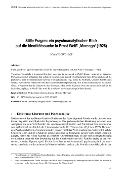Stille Fragen: ein psychoanalytischer Blick auf die Identitätssuche in Ernst Weiß’ ‚Marengo‘ (1926)
( Silent questions: a psychoanalytic look at the search for identity in Ernst Weiß’s ‘Marengo’ (1926) )

Author
Smrkovský, Michal
Publication date
2023Published in
Acta Facultatis Philosophicae Universitatis Ostraviensis. Studia germanisticaVolume / Issue
2023 (32)ISBN / ISSN
ISSN: 1803-408XISBN / ISSN
eISSN: 2571-0273Metadata
Show full item recordCollections
Abstract
Ziel des Artikels ist es, die Kurzgeschichte als einen Wendepunkt in Weiß' literarischem Werk darzustellen, als seine Abkehr von expressionistischen Einflüssen, die seine existenzielle Periode einleitet. Die theoretische Grundlage für eine Analyse der Handlung bilden psychoanalytische Theorien der Objektbeziehung (z.B. Arbeiten von Fairbairn, Guntrip, Seinfeld u.a.), insbesondere im Zusammenhang mit der sogenannten schizoiden Persönlichkeit. In der Relationalität des disillusionierten Protagonisten wird der Interpretationsschlüssel gesucht, ein Schlüssel zur Abwendung vom expressionistischen Kult des Individuums, der in Weiß' Spätwerk durch eine Reihe von nach ihrer Identität suchenden Helden ersetzt wird.
The aim of the article is to present this short story as a turning point in Weiß's literary work, as his departure from expressionist influences that ushers in his existential period. The theoretical basis for an analysis of the plot draws from psychoanalytical theories of object relations (e.g. works by Fairbairn, Guntrip, Seinfeld and others), especially in connection with the so-called schizoid personality. It is in the relationality of the disillusioned protagonist that the interpretive key is sought, a key to the departure from the expressionist cult of the individual, replaced in Weiß's late work by a series of heroes searching for their identity.
Keywords
Ernst Weiß, Objektbeziehungstheorie, Identität, Marengo
Ernst Weiß, object relations theory, identity, Marengo
Permanent link
https://hdl.handle.net/20.500.14178/2467License
Full text of this result is licensed under: Creative Commons Uveďte původ-Neužívejte dílo komerčně 4.0 International

